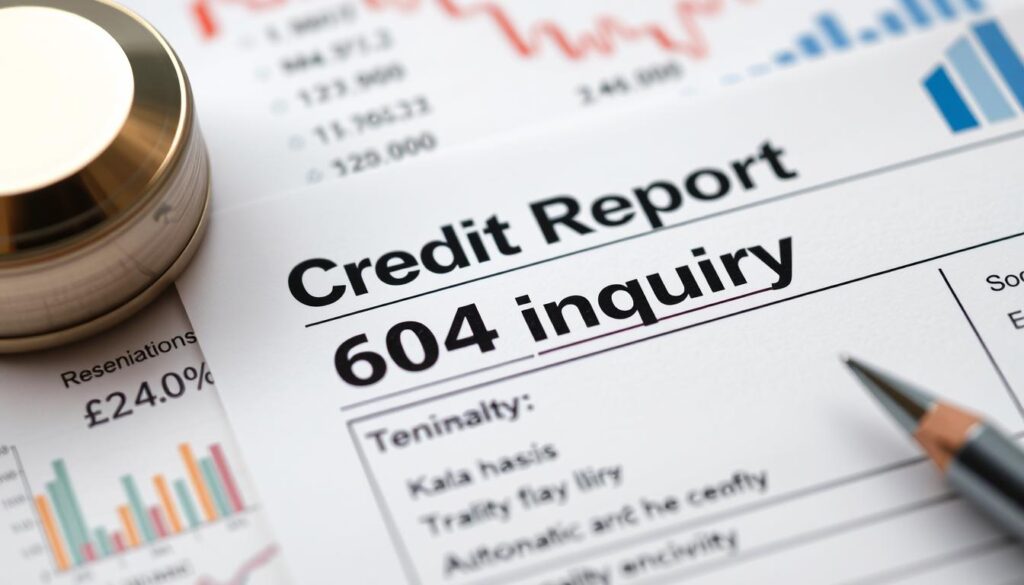A healthy credit report is vital for financial success. Unauthorized 604 inquiries can harm your credit score. This guide offers a template to remove these unwanted entries.
Our 604 inquiry removal letter PDF helps you dispute credit report issues. By following these steps, you can boost your credit score. This protects your financial well-being.
Key Takeaways
- Understand the different types of credit inquiries and their impact on your credit score.
- Learn how to identify and dispute unauthorized 604 credit inquiries.
- Discover a proven template for crafting an effective 604 inquiry removal letter.
- Familiarize yourself with the Fair Credit Reporting Act (FCRA) and your consumer rights.
- Implement strategic follow-up tactics to ensure the successful removal of 604 inquiries.
Understanding Credit Inquiries and Their Impact
Credit inquiries are key to maintaining a healthy credit profile. They’re requests made by lenders to review your credit history. Understanding different types of inquiries is vital for managing your credit effectively.
Types of Credit Inquiries
Two main types of credit inquiries exist: hard inquiries and soft inquiries. These inquiries affect your credit report and disputes differently. Knowing their differences is crucial for managing your credit.
Hard vs. Soft Inquiries
- Hard Inquiries occur when you apply for new credit, like a credit card or loan. They can negatively impact your credit score and FCRA compliance. These inquiries may stay on your credit report for up to two years.
- Soft Inquiries are for pre-approval or when you check your own credit. They don’t affect your credit score or show up on lender-viewed reports.
Knowing the difference between hard and soft inquiries is vital. It helps in disputing credit report errors and protecting your rights. This knowledge allows you to make smart decisions about credit applications.
Being aware of inquiry impacts helps maintain a strong credit profile. It’s a key step in managing your financial health effectively.
| Hard Inquiries | Soft Inquiries |
|---|---|
| Occur when you apply for new credit | Occur for pre-approval or self-checks |
| Can negatively impact your credit score | Do not affect your credit score |
| Remain on your credit report for up to 2 years | Not visible to lenders on your credit report |
Staying informed about credit inquiries is the first step in maintaining a healthy credit profile and protecting your financial well-being.
What is a 604 Inquiry?
A 604 inquiry is a type of credit report dispute inquiry. It appears on your credit report when someone disputes an item with a credit bureau.
This inquiry records that a dispute was filed. It’s considered a “hard” inquiry and can temporarily lower your credit score.
Understanding 604 inquiries is vital for maintaining a healthy credit profile. Knowing about FCRA compliance and disputing errors on your credit report can help manage these inquiries effectively.
Key Characteristics of 604 Inquiries
- Triggered by credit report disputes with credit bureaus
- Considered a “hard” inquiry, which can temporarily lower your credit score
- Remain on your credit report for up to two years
- Indicate that you or someone else has taken action to dispute errors on your credit report
604 inquiries play a crucial role in maintaining a healthy credit report. They show that action has been taken to address potential errors.
Being proactive with the 604 inquiry removal process is important. It ensures your credit profile accurately reflects your financial history and creditworthiness.

Why Remove 604 Inquiries?
Removing 604 inquiries from your credit report can boost your credit score. These “account review” or “soft pull” inquiries affect your creditworthiness. They don’t directly impact your credit score but can influence it indirectly.
Effects on Credit Score
Lenders may see multiple 604 inquiries as a sign of financial instability. This could lead to loan denials or less favorable terms. Reducing these inquiries shows financial responsibility.
It makes you more appealing for loans and credit cards. You’ll have better chances of securing financial products with good terms.
Disputing Unauthorized Inquiries
Sometimes, 604 inquiries result from unauthorized or fraudulent activity. The Fair Credit Reporting Act (FCRA) gives you the right to dispute inaccurate information. This includes unrecognized 604 inquiries on your credit report.
Disputing unauthorized inquiries protects your consumer rights. It improves your credit report’s accuracy, leading to a better credit score.
Taking action to remove 604 inquiries can positively impact your credit score. It improves your overall financial well-being. Understanding your rights helps you take control of your credit profile.
604 Inquiry Removal Letter PDF
Addressing unauthorized credit inquiries is vital for a healthy credit profile. The 604 inquiry removal letter PDF helps dispute unwanted entries on your credit report. This template empowers you to communicate with credit bureaus and assert your rights.
This PDF guides you in removing negative credit entries like 604 inquiries. It’s a tool to clean your credit report and boost your credit rating. You can take charge of your financial future with this resource.
The letter explains how to request removal of 604 inquiries linked to credit repair activities. By sending this to credit bureaus, you show your knowledge of the Fair Credit Reporting Act. You’re exercising your right to remove inaccurate information from your file.
| Key Benefits of the 604 Inquiry Removal Letter PDF |
|---|
|
Use this letter to actively maintain a good credit profile. It’s a step towards achieving your financial goals. Take control of your credit health and shape your financial future.
Crafting an Effective Removal Letter
A well-crafted 604 inquiry removal letter can help address unwanted credit inquiries. It formally asks credit bureaus to investigate and remove unauthorized or inaccurate credit inquiries. This process aligns with the Fair Credit Reporting Act (FCRA).
Essential Letter Components
Include key elements in your 604 inquiry removal letter for best results. These components will make your letter more effective.
- Clear Statement of the Issue: Identify the specific credit inquiries you’re disputing. Include details like the date and company that made the inquiry. Explain why you believe it’s unauthorized or inaccurate.
- Supporting Documentation: Gather relevant documents like credit reports or account statements. These serve as evidence to support your claim. They show your commitment to FCRA compliance.
- Formal Request for Removal: Clearly ask credit bureaus to investigate and remove disputed credit inquiries. Make sure this aligns with the Fair Credit Reporting Act.
- Contact Information: Include your full name, current address, phone number, and email address. This helps with communication and follow-up.
A well-structured 604 inquiry removal letter improves your chances of success. It helps in disputing errors and restoring your credit health.
Complying with the Fair Credit Reporting Act
The Fair Credit Reporting Act (FCRA) protects consumer rights and governs credit bureaus. It’s a powerful tool for FCRA compliance and removing unauthorized credit bureau disputes. Understanding this law is crucial when disputing credit inquiries.
The FCRA allows consumers to dispute errors on their credit reports. This includes disputing errors like fraudulent or unauthorized credit inquiries. Credit bureaus must investigate and fix inaccuracies on your report.
“The FCRA is a vital piece of legislation that empowers consumers to take control of their credit reports and protect their consumer rights.”
Knowing FCRA provisions helps you leverage its protections when disputing credit inquiries. Learn about the required steps and timelines for credit bureaus. Understand the consequences they face for non-compliance.

FCRA compliance is both a legal requirement and key to removing unwanted credit inquiries. Stay informed about your consumer rights. This knowledge helps you navigate credit bureau disputes confidently and effectively.
Sending the Removal Letter
After writing your 604 inquiry removal letter, it’s time to submit it to credit bureaus. This step is crucial for effective dispute handling and prompt credit report updates.
Submission Methods
You have several options for submitting your credit report dispute letter. Choose the method that works best for you.
- Mail the letter via certified mail with return receipt requested, ensuring you have proof of delivery.
- Submit the letter electronically through the credit bureau’s online dispute portal, if available.
- Fax the letter to the credit bureau’s designated dispute resolution department.
Keep detailed records of your submission. This includes tracking numbers, confirmation receipts, and the date you sent the letter.
Follow-up Strategies
After sending your 604 inquiry removal letter, follow up on your credit bureau disputes. Check the progress every 30-45 days.
Be ready to act if you don’t get a timely response. Know the legally mandated timeframe for resolution.
- Periodically review your credit reports to ensure the disputed 604 inquiries have been removed.
- If the bureaus fail to respond or the inquiry remains, submit a written follow-up letter reiterating your request.
- Consider filing a complaint with the Consumer Financial Protection Bureau (CFPB) if the credit bureaus continue to ignore your dispute.
Stay proactive and use effective follow-up strategies. This approach can boost your chances of removing 604 inquiries from your credit report.
Monitoring Credit Reports
Keep an eye on your credit profile even after removing 604 inquiries. Regular reviews help spot new errors or unauthorized activity. These issues can affect your credit score and financial health.
Monitoring your reports allows you to take action quickly. You can dispute errors and remove negative entries. This process helps improve your credit score over time.
Credit report disputes and monitoring are key to protecting your profile. Stay alert and informed about your credit history. This vigilance empowers you to make smart financial choices.

